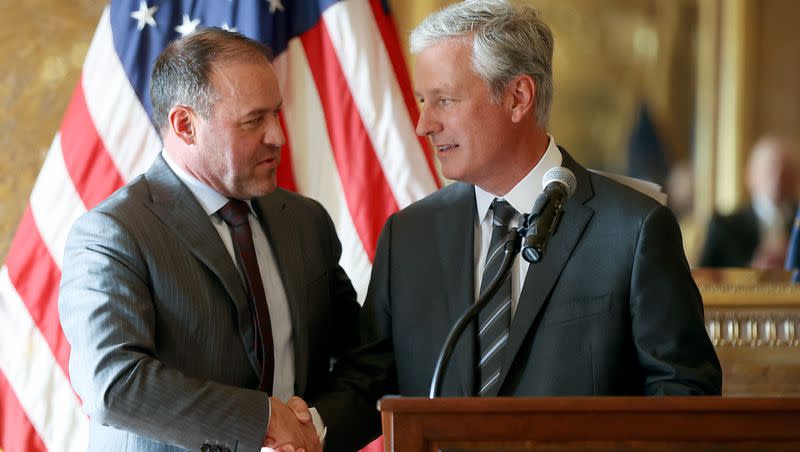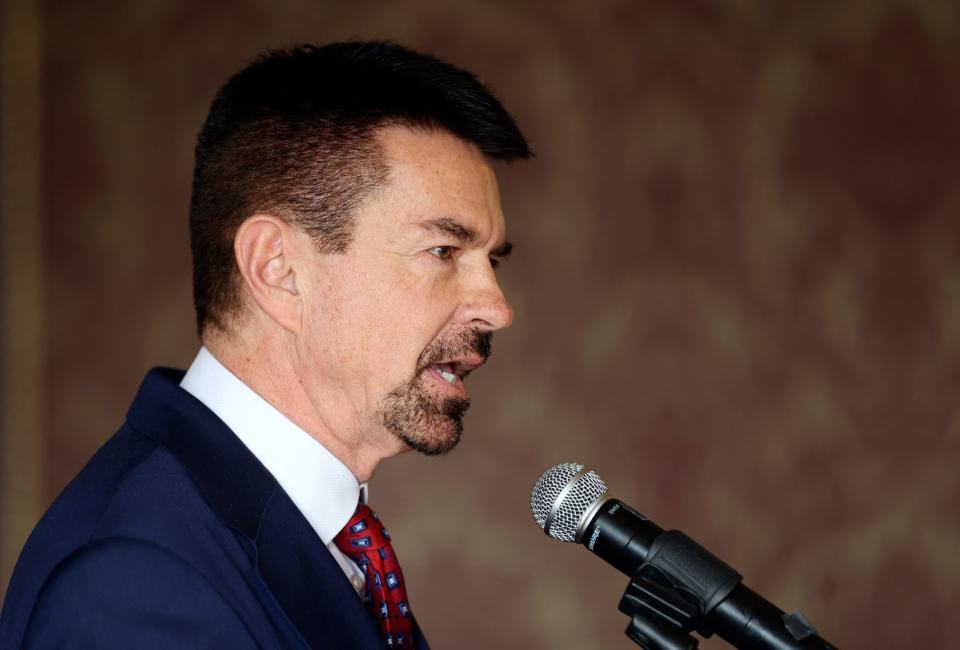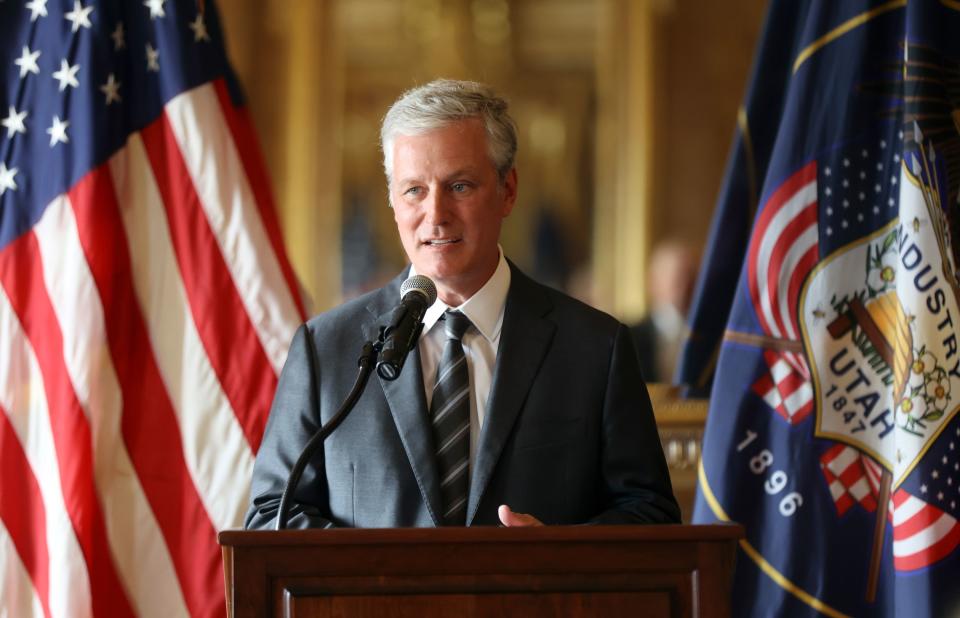Utah lawmakers move to ban land sales to some foreign entities

Utah House lawmakers presented legislation aimed at preventing foreign entities from interfering with military operations in the state during a national security press conference at the Capitol Building on Monday.
State House Speaker Mike Schultz, R-Hooper, was joined by the bill’s sponsors and former national security adviser Robert O’Brien in the Gold Room, where the all-Republican delegation described its efforts to preempt espionage and influence campaigns from China, Russia, North Korea and Iran.
“This is an important issue, not only to the state of Utah, but to our national security as a whole,” Schultz told the group of a few dozen lawmakers and reporters.
The House and Senate Republican caucuses, Schultz said, received a briefing from the Utah National Guard during the summer of 2023 on the potential threats posed by unfriendly governments setting up shop in the state through land buys and technology sales.
“I think that scared us all a little bit,” Schultz said. “And so we’re all trying to do all we can to take action and make sure that we’re not just doing all we can to protect our nation, but more specifically here in Utah.”
O’Brien, who served as President Donald Trump’s principal adviser on foreign policy issues from 2019 to 2021, said it would take a “whole-of-government approach,” including legislative action from all 50 states, to defend against efforts by foreign actors to spy on military operations, censure speech on college campuses, spread propaganda and influence election outcomes.
“You can’t come to America and buy our farmland and spy on our military bases and pre-position yourself to use those assets to disrupt us in the event of a war,” O’Brien told the Deseret News.

How are state lawmakers keeping Utah land from ‘restricted foreign entities’?
Taking the lead on the issue is Rep. Candice Pierucci, R-Herriman, who authored a resolution in 2021 encouraging the closure of university Chinese language learning centers in Utah because of security concerns and passed legislation in 2023 restricting foreign military companies from owning land in the state.
Expanding on last session’s measure, Pierucci has sponsored a bill, HB516, that would restrict entities owned by or headquartered in China, Iran, North Korea or Russia from acquiring any land in the state. It would require any of these “restricted foreign entities” — as they are labeled by Congress’ National Defense Authorization Act — to sell their interests in the state within one year. If they fail to do so, the land would be returned “to the state to be sold,” Pierucci said.
The bill would also require the Utah Department of Public Safety to keep a publicly available list of “restricted foreign entities” and would require country recorders to report prohibited land sales to the department. Pierucci said at this time they are not sharing the names of any specific companies in the state that would have to give up their holdings.
“National security ... is more and more becoming a state’s issue,” Pierucci said. “And more and more of us as states are feeling the need to step forward and address this concern, to help protect our citizens, individual privacy and data, businesses and our land as a state.”
Chinese firms own a total of 383,934 acres across the country, a USDA report from 2023 found. Utah ranks fourth in terms of Chinese agricultural land holdings, The Wall Street Journal reported, with the number of acres owned by Chinese firms exceeding 35,000, according to multiple media reports and confirmed by Pierucci.
Pierucci also spoke about HB404, which mirrors Department of Defense policy, she said, and would prohibit public entities from purchasing technology made by China, Iran, North Korea or Russia — or by companies, and their affiliates, that are owned or directly controlled by these countries.
The bill would also prohibit “sister city” relationships with places “housing a slave labor camp,” Pierucci said, and would parrot Congress’ Uyghur Forced Labor Prevention Act by prohibiting the state from purchasing products made by slave labor.
HB404 will be presented in the House Political Subdivisions Standing Committee on Tuesday. HB516 was introduced last week and is still being considered by the House Rules Committee.

How are Utah lawmakers protecting military bases?
A retired Army major general, Rep. Jefferson Burton, R-Salem, said the state needs to take steps to protect its seven military bases and training centers, from a “war by other means,” which he says includes thousands of daily cyber attacks.
Burton, the former adjutant general of the Utah National Guard, said his bill, HB117, would require owners of wind energy facilities in Utah to undergo military “clearinghouse” procedures to determine whether the facility will have an adverse impact on the military.
“The military loves alternative sources of energy,” Burton said. “But what we can’t have is somebody building a facility in military airspace, blocking military airspace.”
The legislation also includes penalties for noncompliance. It has already passed the House with unanimous bipartisan support and could come up for a full Senate vote as soon as this week.
Finally, in an effort to create a security “buffer” around the state’s military facilities amid rapid population growth, Rep. Val Peterson, R-Orem, has introduced legislation, HB256, which would require municipalities to create a special land use plan with the military.
“One of the biggest threats to them is the amount of people that are coming in and building right along the borders of those bases,” Peterson said.
The new land use designation would affect a mile-wide radius around each of the state’s bases. It would not apply to individuals that already have a vested right to develop in the area, Peterson said, but all other applications that are determined to not be in compliance with relevant military uses or that will have an “adverse effect on the operations of the military installation” will be denied.
Peterson’s bill has already passed the House and Senate with unanimous bipartisan support and will now head to the governor’s desk.
Utah’s $19.3 billion defense industry represents 20% of the state’s GDP, Pierucci and Peterson noted, employing approximately 32,000 people in 944 companies.
“This is a great state. We want to keep it great. And we want to make sure that we’re contributing to our nation in our nation’s defense,” Peterson said.

